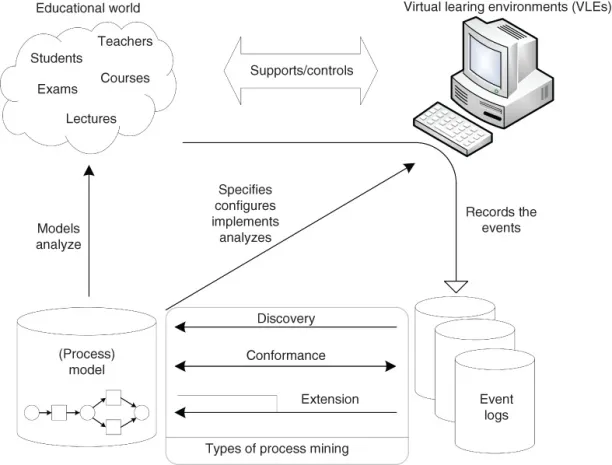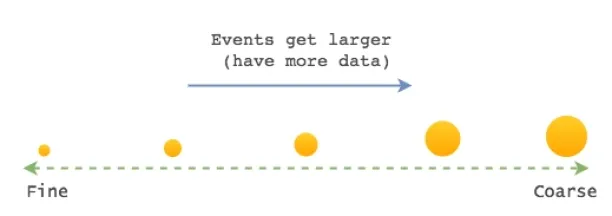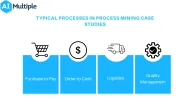Covid-19 forced countries to adopt online or hybrid learning to meet expected targets, but many still struggle with the transition. While some countries, like Italy, saw a 4.7% improvement in student progress with online tutoring, others failed to achieve similar results.1 Recently, education leaders have begun exploring use cases of process mining to enhance online learning platforms, teaching methods, and student learning habits.
In this article, we explain what is educational process mining, what are the use cases, benefits and challenges of applying process mining to educational domains.
What is educational process mining?
Educational process mining (EPM) is the practice of leveraging tools to discover insights in educational data which comes from various sources and is stored in different formats. Today, with the increasing use of information communication technology (ICT) in education, online learning solutions have gained popularity, generating large data volumes.
Educational data contains information on educational processes consisting from organizational and didactic measures. This data provides information about the educational performance based on the state standards of education.
For example, educational data can include information about a student-related processes such as:
- Educational materials student access overtime on a learning management system (LMS) (e.g. topic, resources)
- Student interactions with the educational platform overtime (e.g. login, logout, video, test)
- Student’s process of problem-solving (e.g. use of a calculator, answer elimination, resetting question)
Figure 1 below shows the general overview of educational process mining.

Educational process mining vs educational data mining
Educational process mining (EPM) is a subset of educational data mining (EDM) that analyzes educational data to uncover patterns and relationships. Unlike EDM, which is not process-centric and doesn’t focus on event data, EPM uses techniques like classification, clustering, and regression but adds value by mapping control-flows and processes. Process mining bridges this gap by offering visual representations of educational processes.
What are the use cases of educational process mining?
Some of the applications of educational process mining in the academic literature includes:
Improving online learning platforms
Process mining can discover UI navigation processes on learning platforms. This data can be leveraged by platform developers to improve user experience accordingly. For example, if a certain amount of students log out after a series of events, it indicates a pattern of dissatisfaction.
Process mining can help users understand the pitfalls (e.g. examples videos longer than 20 min, lack of playback speed, unorganized course materials) in the system and underlying events in order to improve user experience on the platform.
Finding effective learning processes
Process mining can be applied to understand students’ learning processes. For instance, by separating students based on their performance and growth measures, learning processes that bring higher output can be detected and recommended to other students as well. Such personalized recommendations might help improve students’ learning efficiency and programs’ effectiveness.
In a case study conducted at a university in Thailand, researchers leveraged process mining to compare low and high performance students’ study behaviors. The study finds that high performance students study in smaller teams (2-4 people) and they have less loopbacks and bottlenecks than the low performance students. Low performance students are reported as prolonging to move onto a new subject.
Improving problem solving
Educational process mining can help discover and improve problem solving skills of students. Problem solving data can include the steps taken until the task is done and which tools used during the process (e.g. calculator, google). Based on findings, students can be encouraged to follow the more beneficial strategies.
For example, in a case study published by OECD, computer-based assessment data is discovered by using process mining techniques. Researches analyzes the human-computer interaction to find out if the problem-solving strategies of students who received most correct answers in the given tasks. They found out that among three student clusters, those who checked all the sources efficiently are the most successful ones.
Improving higher degree research / PhD students journey
By implementing educational process mining, universities can improve the student-supervisor experience and standardize high-degree research (HDR) services. PhD candidates are expected to complete their studies in 3-5 years, yet high withdrawal rates persist due to the unstructured nature of the PhD journey. Contributing factors include various activities, research uncertainties, and the program’s long duration.2
For instance, in a case study at the Queensland University of Technology in Australia, researchers leveraged process mining tools to examine the reasons why PhD students withdraw by analyzing the educational process data of PhD student journey. The main goal of this enterprise project was the improving PhD journey experiences and increasing efficiency of research management.
What are the benefits of educational process mining?
Some benefits of exploring educational data with process mining includes:
- Understanding and improving:
- Learning habits at personalized level
- Performance KPIs
- Skills students gain with education
- Management of learning objects
- Providing advice for students and teachers.
- Optimizing educational materials and curriculum.
What are the challenges of implementing educational process mining?
Some of the challenges researches experience when they implement process mining in educational domains list as:
Data volume
Challenge: Event logs might contain massive amounts of fine granular events in educational data. Fine-grained events are expressive events with detailed information. One way to overcome the fine granular events issue is to break these large event logs into smaller sections and then cluster them to analyze.

Solution: Organizations can leverage machine learning clustering algorithms, such as decision trees or k-mean clustering, to create clusters of event logs which can be used as input to the process mining tool instead of the entire dataset.
Data heterogeneity & complexity
Challenge: Educational processes’ data tend to come in unstructured formats (e.g. images, videos, PDFs) with many exceptions because there is a high diversity among learning habits and paths of students. Therefore, when these processes are discovered, the models are spaghetti models, which are complex and relatively difficult to understand.
Solution: Organizations can leverage tools to generate machine-readable data from the unstructured format, such as optical character recognition (OCR) or natural language processing (NLP) algorithms. The resulting structured data can be used as input to the process mining tool.
Further reading
To learn how more about digital transformation in education:
- 12 Digital transformation trends & use cases in education
- Top 13 Use Cases of RPA in Education
- Top 5 Use Cases of Conversational AI in Education
If you believe your business can benefit from process mining tools, you can check our data-driven list of process mining software and other automation solutions.
Check out comprehensive and constantly updated list of process mining case studies to learn more real-life examples for process mining in education.
And you can let us find you the right vendor:


Comments
Your email address will not be published. All fields are required.